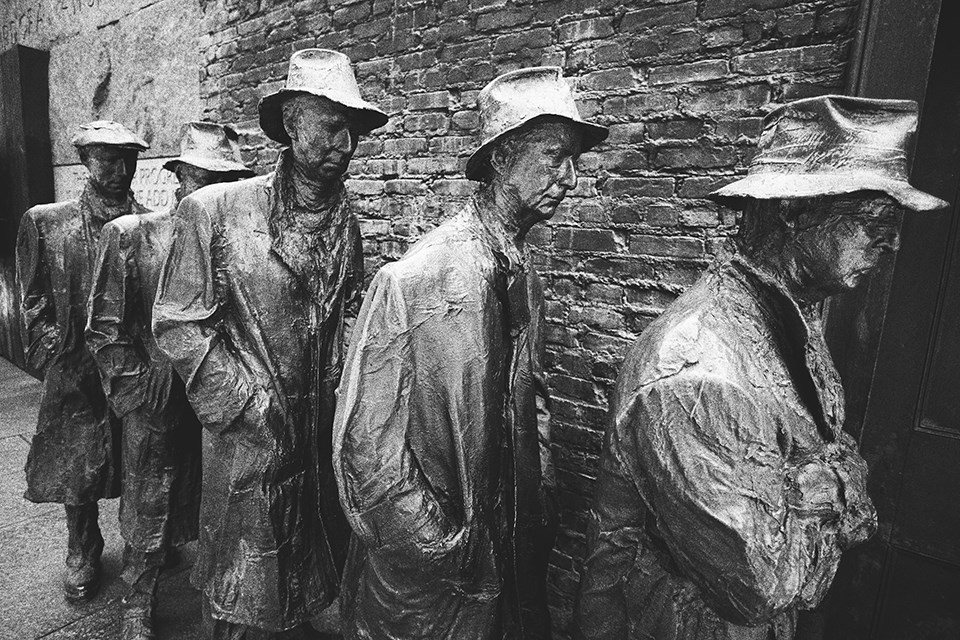“Those who do not learn from history are condemned to repeat it.” One chapter of history we must not repeat is the Great Depression of the 1930s. With no adults still alive from that time, we must rely on historical records to understand its lessons.
After the First World War, the victorious Allies imposed harsh conditions on Germany, including crippling reparations. This contributed to severe economic instability across Europe, including Britain, beginning in the 1920s. Meanwhile, in North America, the Great Depression is often traced to the 1929 stock market crash, which wiped out fortunes overnight and set off a cascade of financial failures. The economic collapse persisted on both sides of the Atlantic until the Second World War began in 1939, finally lifting economies through wartime production.
The Great Depression in North America produced an unemployment rate of 25 per cent, with one in four workers unable to find a job. This was before the advent of social safety nets like employment insurance. Most families depended on a single earner, leaving many households in desperate conditions. Breadlines and soup kitchens became symbols of the era as people struggled to meet basic needs. The Depression’s impact was so profound that the term “depression” is no longer used to describe economic downturns. Instead, we now refer to them as “recessions” or other gentler terms. But why revisit this dark period of history now?
One major factor that worsened the Great Depression was protectionism – manifested through tariffs, trade barriers and restrictions on the free movement of goods. Alarmingly, this harmful approach appears to be resurfacing today. Since the Second World War, global free trade has lifted living standards and reduced poverty on an unprecedented scale. Yet some nations, including the United States, are now embracing tariffs as a supposed solution to slower economic growth and manufacturing job losses to Asia. This reasoning is flawed for several reasons.
First, the U.S. economy does not need drastic measures. Currently, its GDP is growing at around three per cent annually – its long-term trend – and its unemployment rate is about four per cent, which most economists consider close to full employment. By contrast, Canada and Europe are struggling with GDP growth hovering around one per cent. Despite the U.S.’s robust economic health, political rhetoric often focuses on solutions for crises that do not exist.
Second, manufacturing jobs are no longer the magic solution for economic growth they once were. Technological advances mean fewer workers are needed to produce goods. Machines dominate manufacturing, and as artificial intelligence develops, even the machines will require minimal human intervention. Goods production now accounts for less than 10 per cent of overall employment, and that
figure includes construction. The jobs that do exist in manufacturing demand advanced skills and education, which much of the current labour force lacks.
Third, tariffs do not deliver the benefits their proponents claim. Contrary to Donald Trump’s assertions, tariffs generate limited government revenue while significantly reducing the availability of imports. Imagine empty shelves at Walmart. Domestic prices rise as local producers face less competition, inevitably leading to inflation. Consumers pay more for less, and economic growth slows.
Protectionism also harms the very citizens it claims to help. When tariffs create monopolies for local industries, those industries become less productive and less innovative. Inflation grows, jobs become harder to find, and living standards decline. Rather than creating economic strength, protectionism often leads to stagnation and hardship.
Worse, tariffs tend to be contagious. When one country imposes tariffs, its trading partners retaliate, creating a cycle of escalating barriers to trade. This is precisely what happened in the 1930s. Countries raised tariffs in a misguided attempt to protect domestic industries, but the result was a downward economic spiral that deepened and prolonged the Great Depression.
The lessons of history are clear. Tariffs and protectionism do not make nations great – they make them poorer, weaker and less competitive. While it is understandable that countries want to safeguard their economies, the evidence shows that open trade and collaboration yield far better results. Since the Second World War, global free trade has driven the highest standard of living in history and lifted billions out of poverty.
It is vital to resist the lure of protectionism and the false promises it offers. Instead, countries should focus on fostering innovation, investing in education and training, and building economies that can adapt to the demands of the 21st century.
Let us remember the lessons of the Great Depression and choose a path that leads to shared prosperity, not economic decline.
Dr. Roslyn Kunin is a respected Canadian economist known for her extensive work in economic forecasting, public policy, and labour market analysis. She has held various prominent roles, including serving as the regional director for the federal government’s Department of Employment and Immigration in British Columbia and Yukon and as an adjunct professor at the University of British Columbia. Dr. Kunin is also recognized for her contributions to economic development, particularly in Western Canada.
©




